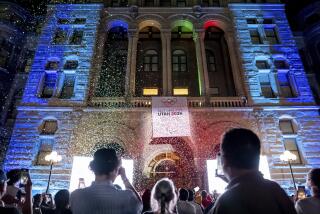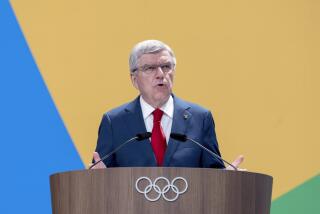Tashkent’s Long-Shot Olympic Bid: Oodles of Hospitality, Few Facilities
- Share via
TASHKENT, Uzbekistan — There are no world-class sports facilities in this Central Asian desert oasis, no modern airport, no lakes for yachting.
Yet, Tashkent has launched an audacious bid to host the 2000 Summer Olympics as part of a broader campaign to improve life in one of the poorest corners of the former Soviet Union.
“Of course it would be good for sports, we’ll build lots of facilities. But we also want the whole world to know about us in Uzbekistan,” said Ruziev Sabirjan, vice-president of the Tashkent Olympic Committee.
“The Olympic Games would completely change the republic for the people,” said Sabirjan, a silver medalist in fencing at the 1980 Games in Moscow.
The 1980 Games were the first and last Olympics held in the Soviet Union, and they were tarnished by a U.S.-led Western boycott protesting the invasion of Afghanistan.
Sabirjan acknowledged in an interview that Tashkent would have to start from scratch if awarded the Games over seven other contenders: Berlin, Beijing, Sydney, Manchester, Milan, Istanbul and Brasilia. The International Olympic Committee will pick a city in September 1993.
Tashkent would have to build 24 sports facilities, including an Olympic-size stadium, as well as an airport, hotels, press center and even a hospital, Sabirjan said. Six existing swimming pools are Olympic-regulation 50 meters long, but all need work.
All that construction would cost at least $6.5 billion, he said, not including the bill for wining and dining Olympic Committee members, which alone can cost millions of dollars.
Uzbekistan, the former domain of Persians, Turks and the Mongol hordes of Ghengis Khan, is one of the poorest former Soviet republics, but Sabirjan said both the Uzbek and Tashkent governments have promised funds will be available for the Olympics.
They’re counting on huge revenues from the sale of cotton, gold and newly discovered oil reserves, he said, plus help from foreign investors.
Sabirjan said all Olympic events would be held in Tashkent, except for soccer which would be spread around Uzbekistan. Rowing is slated for the former Soviet Olympic training facility in Samarkand, Uzbekistan’s ancient city of gold-encrusted, blue-mosaic mosques and minarets.
Yachting and sailing events pose a problem for this landlocked desert country, he admitted. The committee is looking at a site on a man-made lake straddling the border with Tajikistan, he said.
Tajikistan has agreed to go along with the plan, he said, although its’s current conflict between the former Communist president and opposition Muslims may damage Tashkent’s chances.
So could the weather: the sun beats down for five months of the year, raising the temperature as high as 116 in July.
Uzbekistan would be the first Muslim nation to host the Olympics, although Sabirjan was quick to quash any suggestion that clerics or believers would be offended by women swimmers and runners displaying lots of bare skin, or by widespread alcohol sales.
“I don’t think we’ll have any” opposition from Muslims, he said. “This is a multinational republic . . . I think people will understand it the right way,” he said.
Uzbekistan is better known for its colorful bazaars, carpets and vast deserts than for sports. Yet its schoolchildren are avid soccer players and Sabirjan said Uzbek athletes regularly were represented on Soviet Olympic teams.
Uzbekistan has 23 candidates for the Summer Olympics in Barcelona, in boxing, weightlifting, track and field, gymnastics, fencing, rowing, wrestling and equestrian events.
Sabirjan said as many as 15 could be picked for the united team of former Soviet republics. Four have a shot at winning a medal: 1991 world champion weightlifters Sergei Syrtsov and Igor Sadykov; pole vaulter Rodion Gataulin, the silver medal winner at the 1988 Seoul Olympics; and Artur Grigorian, who won the silver medal at the 1991 boxing world championships.
More to Read
Go beyond the scoreboard
Get the latest on L.A.'s teams in the daily Sports Report newsletter.
You may occasionally receive promotional content from the Los Angeles Times.






